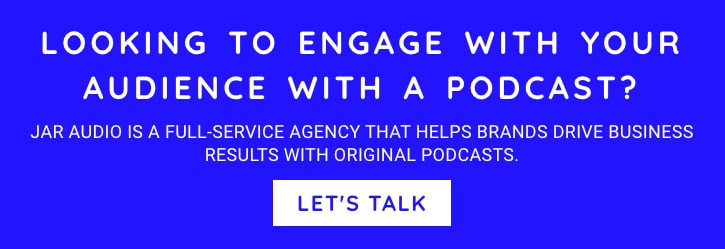Humans vs. AI
By Jen Moss, Co-Founder & Chief Creative Officer of JAR Audio
I used to work with a girl who had an over-pronounced gag reflex. The thing that made her gag more than anything else in the whole world? Falkor. Yes, Falkor – the white “luck dragon” from 80’s cult classic The Neverending Story. Just what was it about this lanky white beast that always made her choke? Tough to say, but it probably had something to do with his reams of silky-smooth fur. It was fur that just seemed to go on, and on, and on. Fur that felt like it could wrap around you in a soft, undulating blanket and never let you go.
Personally, I liked Falkor. But I can see how he might be a bit much for some people.
The Neverending Story is a tantalizing idea though, isn’t it? It’s certainly one that gets bandied around a lot in the current sweaty climate of “always on” content and AI-fever. In fact, I recently read a newsletter by Nathan Baschez called The Infinite Article which poses the question “How close are we to having a personal AI that can write the perfect thing just for us?” The author imagines a self-writing, personally tailored “infinite article.” He describes it somewhat wistfully:
The infinite article appears as an infinite scroll. It greets you each morning with an overview of the things you’re most likely to care about. From there you can ask it to tell you more about anything you like, and the words magically fill themselves in. When reading, you can stop any time, ask questions, and get answers! It’s like upgrading from a seat in a crowded lecture hall to having a 1:1 tutoring session.
Rather than a tutoring session, the breathless tone of these words makes me think of young, socially awkward men in basement labs, designing the perfect robot mate. Swap the word “article” for “girlfriend” and you’ll see what I mean. “The infinite girlfriend greets you each morning.” You can “ask her to tell you more about anything you like.” Creepy, right?
What’s happening here, the reason it feels uncomfortable, is the one-sidedness of the inquiry. The serving up of only what we want in the form of an infinite article/girlfriend. Not a mixture of what we want, and what we need – like a real article/girlfriend.

What we want:
Content, ideas, more flavours, stimulation, new things, everything at our fingertips, more of everything.
What we need:
Wisdom, analysis, curation, quiet, occasional deprivation, loyalty, for things to sometimes be hard to find.
As the Chief Creative Officer of a podcasting company that works with major brands, I’m fending questions about the ROI of an AI-generated podcast. I swim almost daily in a pool of people who casually label the work we make as “content”. This word has always bothered me. It’s a transactional reduction of the raw material we’re working with – which is really “ideas.” Half-decent content isn’t hard to find. But good ideas – truly good ideas – take more work.

So what are the “good ideas” lurking within the potential of AI?
These are still emerging. One thing that seems clear – in podcasting and other creative artforms, AI can be used as a fun brainstorming tool – a “partner” to help combat the tyranny of the blank page. Educators and artists are grappling with the significance of recent AI interventions in fascinating ways. New certificates are popping up – teaching students “how to write AI prompts,” or showing teachers “how to use AI to teach your class.” You can even use one AI (Chat GPT) to prompt another. Giacomo Miceli is a creative coder, entrepreneur, and computer scientist originally from Rome, Italy. He did a fascinating experiment called The Infinite Conversation, where he prompted an AI to generate an endless chat between Bavarian director Werner Herzog and Slovenian philosopher Slavoj Žižek. It’s hilariously serious. Miceli, who describes himself as “an AI Optimist,” writes:
I remain hopeful that we will be able to regulate ourselves, and that we will take experiments such as the Infinite Conversation for what they are: a playful way to help us imagine what our favorite people would do, if we had unlimited access to their minds. Art and Philosophy […] can guide us while navigating these treacherous waters.

Treacherous waters indeed.
But here’s the thing:
As cool as an AI podcast, or an infinite article, or a robot girlfriend might be, these tools will never be as cool as the original ideas that come to you through the alchemy of imagination, or the discipline of careful research, the empathy of human-to-human collaboration, or the open spaces of a resting mind. With art, as with relationships, the energy you put into something determines the energy you receive in return.
To bring this fight into the context of branded podcasting, I’d put it this way: there is no AI substitute for a talented podcast team that takes the time to understand your business problem and craft a custom podcast solution with care and attention. AI may be able to list a bevy of ideas and write a grammatically correct script. But it can’t curate and interpret the ideas effectively based on a nuanced understanding of YOUR company, YOUR products and services, YOUR values, or YOUR audience. It can’t do subtext. It can’t make emotionally intelligent recommendations. AI can no doubt deliver some of what you want. But human ingenuity can deliver both what you want, and what you need.
So back to the Neverending Story. It’s no coincidence that Falcor (sic) is the name of Netflix’s 2015 open-source JavaScript library for efficient data fetching retrieval: the elongated dragon that goes on and on seems, at first, the perfect symbol for this kind of tool. We get excited about a story that never ends, about luck that never runs out, about any kind of automated tool that fetches you more and more of what you want.
But I need to hereby reclaim the idea of The Neverending Story for humans because the AI version — the neverending article/girlfriend – is too limited. Too one-sided. Besides, it misses the whole point of the original story. The book the movie was based on is written by a German author named, (somewhat ironically), Michael ENDe. The story is a cri de coeur for the power of the imagination. In it, an awkward young boy named Bastian discovers a magic book. The story in the book is about Fantastica, a fantasy land threatened by “The Nothing,” a darkness that destroys everything it touches. The kingdom – which is full of magical creatures — needs the help of a human child’s imagination to survive. Bastian must write himself into the story, again and again. And that is what we must continue to do… always.


